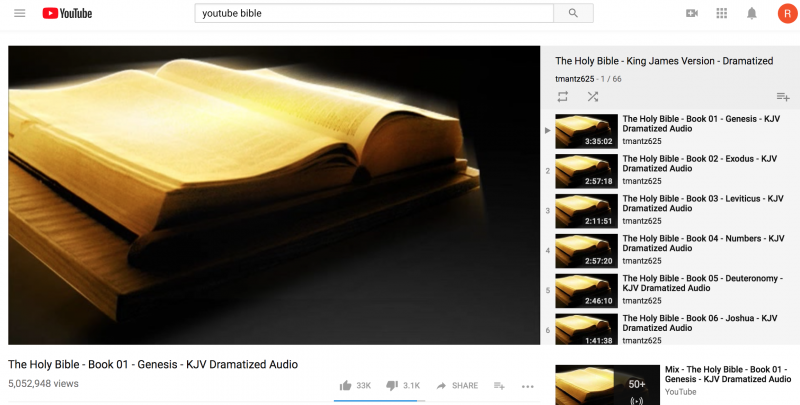Last year, the all-time best seller linked up with social media. During 2011, the four-hundredth anniversary of the King James Bible, Facebook, Twitter, and Twicsy became platforms for celebratory mass readings or rewritings of the Book. The YouTube Bible, one of a handful of projects envisioned by the King James Bible Trust of the U.K., aimed to post videos of people reading all 1,189 chapters. It did not succeed, but it ended up with a sampling of 144.
Those organizations with projects that were completed gave their participants marching orders—read these chapters, write these verses—whereas the YouTube Bible used polite, deferential language and made no assignments (“We hope that as many people as possible from around the world will want to contribute a chapter”). The Bible self-selected. Although some real effort shows through, plenty of unpleasant tasks remained undone: nobody tackled the “begats” of Genesis 5; chapters that might be deemed challenging or embarrassing (see Ezekiel 23 on “whoredoms”) simply went unrecorded. The Psalms, with all their talk of delight and hope and goodness and praise, received by far the greatest number of chapter uploads (thirty-two).
Add in the corruptible, unstable nature of the electronic world—5 of the 144 links are already dead—and the YouTube Bible hardly seems the place to find notable gestures toward immortality, of the text or of the participants. The chapters that seem most likely to survive are the ones that intersect with the preserving power of celebrity: Patricia Routledge’s beautiful reading of John 20, for instance, and—by far the most popular to date—the recording by Prince Charles, which had had more than thirty-eight thousand views as of July 2012.
Still, some content is reinforced with performative illuminations, with self-fashioned attempts at preservation. A newly married couple in wedding clothes takes turns reading Ephesians 5, including the famous admonishment for wives to “submit” themselves unto their husbands; a man drives a tractor on-screen, climbs down, and reads the parable of the sower from Luke 8.
Whatever their implicit address, such gestures always come back to the self as well. Consider noted atheist Richard Dawkins, who, introducing Chapter 2 from the Song of Songs (“an erotic poem”), asserts his scientific allegiance, speaking of “evidence” and “obvious mistranslations” even as he praises his selection’s “charm.” His recording preserves his chapter and an associated tradition of critical commentary, but he mostly seems to be holding on to something immaterial, transitory. He seems to be saying I’m here.
That sense of self-preservation is what comes through in Prince Charles’s chapter, in which he reads from John 14—but only the first fourteen of the chapter’s thirty-one verses. As he begins, in the Chapel Royal in St. James’s Palace, reading glasses already in place, speaker and content align: in the chapter, Jesus speaks to his disciples, and the first half emphasizes a position of privilege (“In my Father’s house are many mansions”). It’s an attractive, benevolent voice with which to align yourself if you’re an authority figure, and the final verse in the selection reinforces the benefits of patrilineage: “If ye shall ask any thing in my name, I will do it.”
But this is where Prince Charles stops reading, thus escaping the turn in the chapter: “If you love me, keep my commandments.” He is spared spelling out additional conditions of access to the Father, as well as a potentially embarrassing admission (“My Father is greater than I”). He also avoids a disturbing revelation: if you align too closely with John 14, its final verses articulate your own death. The whole chapter foreshadows it, but the second half drops the euphemism. “Yet a little while, and the world seeth me no more.”
Who can blame Prince Charles for stopping his John 14 where he does? His omission calls to mind a moment from Stephen Greenblatt’s 1980 Renaissance Self-Fashioning: From More to Shakespeare where, after a few hundred pages of academic argument downplaying self-determination, Greenblatt recounts a personal incident in which he found himself unable to follow a stranger’s request to utter the words I want to die. I want to die. By the same token, the YouTube Bible’s principal chapter, weighing in at less than half complete, lacks the sense of sacrifice to a higher power—and thus the sense of self-sacrifice—that one finds in stauncher forms of religious expression. But when we broadcast ourselves, we still like to believe we have some control. We try to keep ourselves alive in part by what we refuse to say.





